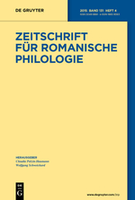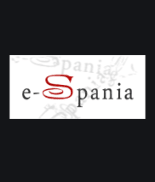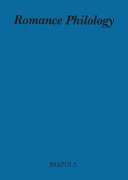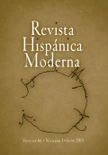
Nueva Revista Filologia Hispanica
metrics 2024
Illuminating the Nuances of the Spanish Language
Introduction
Nueva Revista Filologia Hispánica, published by COLEGIO MEXICO, A C, DEPT PUBLICACIONES, has been a pivotal resource in the field of Hispanic philology since its establishment in 1966, transitioning to an open-access model that enhances the accessibility of scholarly works in the area. With an ISSN of 0185-0121 and an E-ISSN of 2448-6558, the journal is housed in Mexico City and aims to publish innovative research that contributes to the understanding of the linguistic and cultural dynamics of the Spanish language. It consistently ranks in the Q3 category of Linguistics and Language for 2023, reflecting its commitment to academic excellence as demonstrated by its Scopus ranking in both Arts and Humanities and Social Sciences. With converged years from 2011 to 2024, the journal encourages contributions that inspire further discourse among researchers, professionals, and students, thus solidifying its importance as a scholarly platform in the linguistics landscape.
Metrics 2024
 0.13
0.13 0.20
0.20 0.30
0.30 7
7Metrics History
Rank 2024
Scopus
JCI (Web Of Science)
Quartile History
Similar Journals

ESTUDIOS FILOLOGICOS
Illuminating Language and Literary TheoryESTUDIOS FILOLOGICOS is a prestigious journal specialized in the fields of Linguistics and Literature, published by UNIV AUSTRAL CHILE. With an ISSN of 0071-1713 and an E-ISSN of 0717-6171, this journal serves as a vital platform for scholars, researchers, and students to disseminate their findings and foster academic discourse in philology and its related disciplines. Renowned for its rigorous peer-review process, ESTUDIOS FILOLOGICOS holds an impressive position with a Q2 ranking in Linguistics and Language and a Q1 ranking in Literature and Literary Theory as of 2023. Situated in Valdivia, Chile, and spanning from 2007 to 2023, this journal not only contributes significantly to the academic community but also engages with diverse voices in the humanities. By maintaining a balanced focus on high-quality research and accessible discourse, ESTUDIOS FILOLOGICOS continues to play an essential role in promoting scholarly information and engagement within the fields of language and literature.

BOLETIN DE LA REAL ACADEMIA ESPANOLA
Fostering Insightful Discussions in Language ResearchBOLETIN DE LA REAL ACADEMIA ESPANOLA, published by the Real Academia Española, serves as a central conduit for scholarly discourse in the fields of Linguistics and Language. With an ISSN of 0210-4822 and an E-ISSN of 2445-0898, this esteemed journal has been disseminating impactful research since its inception in 2003. As a recognized Q2 journal in Linguistics and Language for 2023, it ranks in the 45th percentile in Arts and Humanities and 42nd percentile in Social Sciences according to Scopus metrics, reflecting its solid position in academic circles. Although not an open-access journal, it remains a crucial resource for those engaged in the vibrant study of language, providing insights that inform both theoretical frameworks and practical applications. Researchers, professionals, and students alike will find prominent studies and discussions that contribute to the evolution of linguistic scholarship. The journal is published in Madrid, Spain—an environment rich in linguistic heritage that further enhances its significance in the global academic community.

Linguistica e Filologia
Unlocking the Depths of Linguistics and Philology.Linguistica e Filologia is a prominent academic journal published by UNIV DEGLI STUDI BERGAMO that offers an Open Access platform since 2002, fostering scholarly communication in the fields of linguistics, philology, and comparative literature. With a commitment to advancing understanding in these disciplines, the journal serves as a vital resource for researchers, professionals, and students alike. Its content encompasses diverse theoretical and empirical studies, critiques, and analyses of language and literature, encouraging interdisciplinary dialogue. Hosted in the picturesque city of Bergamo, Italy, the journal aims to bridge gaps between historical and contemporary linguistic practices, enhancing the global discourse on language studies. With a focus on quality, transparency, and accessibility, Linguistica e Filologia plays a crucial role in shaping the future of linguistic scholarship and is an invaluable reference for anyone interested in the intricate relationships between language and culture.

Anales de Literatura Hispanoamericana
Advancing Scholarship in Hispanic Literature and TheoryAnales de Literatura Hispanoamericana, published by UNIV COMPLUTENSE MADRID, SERVICIO PUBLICACIONES, is a prominent journal dedicated to the field of Hispanic literature and literary theory. With a history of publication spanning from 1996 to 2023, this journal provides an essential platform for scholars and researchers exploring diverse aspects of literature within the Hispanic cultural context. Though it currently operates without an open-access model, its scholarly contributions are vital for advancing the understanding of literary phenomena in Spanish-speaking countries. As a Q3 ranked journal in the Literature and Literary Theory category, it engages a global audience interested in high-quality research, and its Scopus ranking places it among the notable publications in the arts and humanities. The journal aims to foster interdisciplinary dialogue, showcasing innovative research and critical analyses that enhance the appreciation of Hispanic literary heritage. Whether you are a seasoned researcher or an emerging scholar, Anales de Literatura Hispanoamericana serves as a crucial resource for advancing your understanding of the rich tapestry of Hispanic literature.

ZEITSCHRIFT FUR ROMANISCHE PHILOLOGIE
Bridging Historical Insights with Modern Literary DiscourseZEITSCHRIFT FUR ROMANISCHE PHILOLOGIE, published by Walter de Gruyter GmbH, stands as a prominent peer-reviewed journal dedicated to the fields of Linguistics, Literature, and Literary Theory. Established in 1877 and continuing its legacy to the present day, this esteemed journal offers a platform for comprehensive scholarship that explores the intricacies of Romance languages and their literary heritage. With a notable Q1 ranking in Literature and Literary Theory and a Q2 ranking in Linguistics and Language, it has secured its place among leading resources in the humanities. Researchers, educators, and students benefit from its rich historical context and current contributions to the understanding of Romance languages and literature. Though currently not available as Open Access, the journal prioritizes the dissemination of high-quality research, making significant strides in fostering academic dialogue and advancement. Its address at Genthiner Straße 13, Berlin, Germany, situates it in a hub of scholarly activity, bridging the past with contemporary literary discourse.

E-Spania-Revue Electronique d etudes Hispaniques Medievales
Diving Deep into the Heart of Medieval Hispanic Literature and HistoryE-Spania-Revue Electronique d'études Hispaniques Medievales, published by UNIV PARIS IV-PARIS-SORBONNE, is a prominent scholarly journal dedicated to the exploration of medieval Hispanic studies. With its Open Access format established since 2006, the journal facilitates the dissemination of research and critical discourse in the field, creating a vibrant platform for academics, researchers, and students alike. With an ISSN of 1951-6169, this journal aims to foster interdisciplinary dialogue surrounding the rich tapestry of medieval Spanish literature, history, and culture. Situated in the heart of Paris, this journal not only seeks to enhance knowledge production but also encourages collaboration among scholars globally, contributing to the ever-growing landscape of Hispanic studies. Through its commitment to accessibility and scholarly rigor, E-Spania remains an invaluable resource for those invested in understanding the complexities of the medieval Hispanic world.

ROMANCE PHILOLOGY
Bridging Theory and Practice in Romance PhilologyROMANCE PHILOLOGY is a distinguished academic journal dedicated to the exploration of language, literature, and linguistic theory within the Romance language family. Published by BREPOLS PUBL, it offers a platform for scholars, researchers, and practitioners to disseminate their findings and engage with the latest developments in these fields. The journal's impact factor reflects its standing, positioned within the Q4 category in Linguistics and Language and Q3 in Literature and Literary Theory for 2023, making it an essential resource for those studying Romance philology. Although coverage in Scopus was discontinued in 2021, the journal maintains a commitment to rigorous academic standards and comprehensive peer-review processes. With a broad scope encompassing theoretical and practical aspects of Romance languages and literatures, ROMANCE PHILOLOGY invites contributions that push the boundaries of knowledge and enrich the academic dialogue surrounding these vital areas of study. For those passionate about linguistic and literary pursuits, this journal stands as a significant gateway into the evolving discourse of Romance studies.

Revista Hispanica Moderna
Illuminating Diverse Perspectives in Literature and CultureRevista Hispanica Moderna, published by University of Pennsylvania Press, is a scholarly journal dedicated to exploring the rich tapestry of Hispanic cultural, historical, and literary studies. With an ISSN of 0034-9593 and an E-ISSN of 1944-6446, this esteemed publication operates within the United States, ensuring a broad international reach. While it currently does not offer Open Access, the journal provides significant insights across diverse fields, categorized as Q4 in Cultural Studies, History, and Literature and Literary Theory as per the 2023 standards. Although the journal ranks in the lower quartiles of its fields, its systematic approach to modern Hispanic studies offers valuable opportunities for gaining perspectives that are often underrepresented. Researchers, professionals, and students are encouraged to engage with its content as it navigates the complexities of cultural identities and historical narratives from 2019 to 2024 and beyond, making important contributions to the ongoing discourse in the humanities.

CONFLUENCIA-REVISTA HISPANICA DE CULTURA Y LITERATURA
Fostering Dialogue in Hispanic Cultural StudiesCONFLUENCIA-REVISTA HISPANICA DE CULTURA Y LITERATURA, published by Colorado State University, is a pivotal academic journal that has been contributing to the fields of Cultural Studies, Literature and Literary Theory, and Visual Arts and Performing Arts since 2002. With its ISSN 0888-6091 and E-ISSN 2328-6962, the journal aims to foster interdisciplinary dialogue and showcase innovative research that bridges literary analysis with cultural phenomena. As highlighted by its impressive rankings, the journal holds a Q3 category in Cultural Studies and Q2 in both Literature and Literary Theory and Visual Arts and Performing Arts, reflecting its significance and the quality of its contributions. Although it currently does not offer open access, the journal remains a respected platform for scholars, providing rich content that engages and inspires further research in the humanities. As it converges years from 2002 to 2024, CONFLUENCIA stands at the forefront of exploring the complexities of Hispanic culture and literature, making it an indispensable resource for researchers, professionals, and students alike.

Dirasat Hispanicas-Revista Tunecina de Estudios Hispanicos
Exploring the Rich Tapestry of Hispanic StudiesDirasat Hispanicas-Revista Tunecina de Estudios Hispanicos is a pivotal academic journal published by UNIV TUNIS MANAR, INST SUPERIEUR SCIENCES HUMAINES TUNIS, dedicated to the exploration and analysis of Hispanic studies within the broader context of history, linguistics, and literature. Established in Tunisia, this journal has transitioned to an Open Access model since 2014, promoting the dissemination of knowledge and fostering scholarly exchange among researchers, professionals, and students globally. With its ISSN 2286-5977 and esteemed recognition in various categories, including Q4 in History and Linguistics and Q3 in Literature and Literary Theory, Dirasat Hispanicas strives to bridge gaps in Hispanic scholarship by inviting diverse critical perspectives and innovative research. While its Scopus rankings reflect an evolving presence in the academic landscape, the journal remains committed to enhancing the visibility and impact of Hispanic studies. The journal continues to encourage submissions that contribute to its mission of intellectual advancement, making it an essential resource for those engaged in the rich tapestry of Hispanic cultural and linguistic heritage.